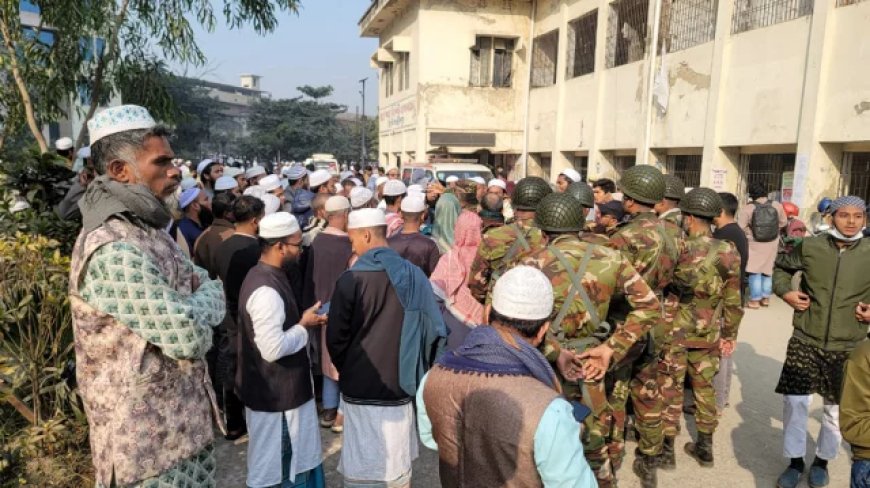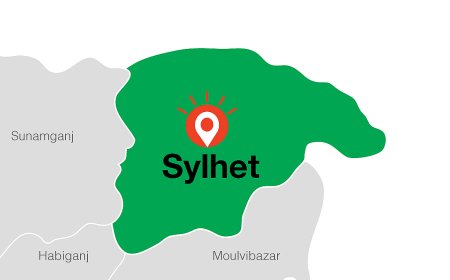What triggered the violent clashes between Tabligh Jamaat factions in Tongi?
What triggered the violent clashes between Tabligh Jamaat factions in Tongi?

- The conflict arises from Maulana Saad's controversial statements and his claim to be the sole Ameer.
- Attempts to mediate and resolve the dispute have been unsuccessful, leaving both factions firmly entrenched in their opposing stances.
Deadly Clashes in Tongi Between Tabligh Jamaat Factions
In Gazipur’s Tongi, violent clashes erupted between followers of Maulana Saad and Maulana Zubair, resulting in at least four fatalities and over 100 injuries. The ongoing tensions revolve around control of the World Ijtema field.
Efforts to Resolve the Conflict
On Wednesday afternoon, after separate meetings with the two factions of the Tabligh Jamaat at the Ministry of Home Affairs, Home Affairs Adviser Lieutenant General (retd) Jahangir Alam Chowdhury confirmed the deaths.
The conflict escalated after a violent confrontation around 3 a.m. on Tuesday night over control of the Ijtema ground. Public curiosity about the roots of this division has since intensified.
Origins and Background of Tabligh Jamaat
-
Founding and Spread:
- Tabligh Jamaat was established in 1924 by Maulana Ilyas Kandhalvi in India.
- Its activities later expanded to Bangladesh, Pakistan, and other countries.
-
World Ijtema Tradition:
- Since the 1960s, followers have gathered annually at the Turag River in Tongi for the World Ijtema.
- Initially held in one phase, the event was divided into two phases in 2011 due to growing participation.
- Prominent scholars from India, Pakistan, and Bangladesh deliver sermons, including Maulana Saad, a great-grandson of the founder.
Controversial Statements by Maulana Saad
-
Objections Raised:
- Maulana Saad’s statements during Tabligh gatherings sparked criticism.
- The Fatwa Department of Darul Uloom Deoband identified his remarks as controversial.
-
Statements Highlighted:
- Suggested reforms such as discouraging monetary rewards for religious propagation (e.g., Milad or Waz Mahfil).
- Urged madrassa teachers to pray in mosques to increase community engagement.
-
Opposing Views:
- Critics argued that his views contradicted the principles of Tabligh Jamaat and Ahle Sunnat Wal Jamaat.
- Supporters claimed his reforms were misinterpreted and politicized in Bangladesh.
Escalation of Division
-
Visible Conflict:
- The division became public in November 2017 following a scuffle at the Tabligh Jamaat’s main center in Kakrail, Dhaka.
- In July 2018, Shah Ahmad Shafi, Ameer of Hefazat-e-Islam, participated in a Dhaka conference that banned Maulana Saad from attending future Ijtema events in Bangladesh.
-
Claim to Sole Leadership:
- Maulana Saad’s unilateral declaration as the sole Ameer broke the traditional council-based leadership system, intensifying the division.
- The Surah-e-Nizam council, responsible for Tabligh Jamaat’s global activities, opposed this move, deepening the rift.
Impact on Tabligh Activities
-
Opposing Factions:
- The Shuraye Nizam faction (led by Maulana Zubair) opposed Maulana Saad’s leadership and demanded an apology.
- Maulana Saad’s followers, known as "Atayati," maintained their support for him.
-
Failed Mediation Attempts:
- Several years of attempts to mediate the conflict have failed.
- The division led to further clashes, including a significant confrontation at the Ijtema ground in December 2018.
This ongoing discord continues to disrupt the unity and activities of the Tabligh Jamaat, one of the largest Sunni Muslim organizations in the Indian subcontinent.
What's Your Reaction?





















































































